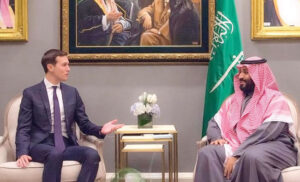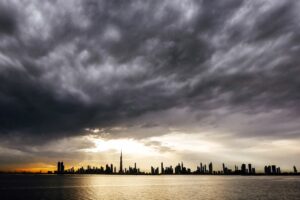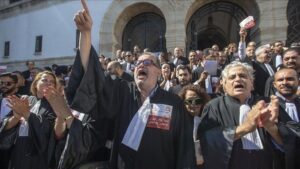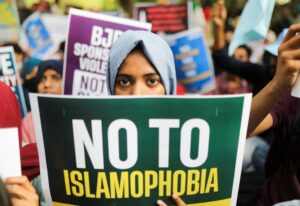
The National Interest Foundation Newsletter
Issue 150, June 9, 2022
Welcome to our NIF Newsletter. In this week’s headlines: the U.S. House Oversight Committee launches an investigation regarding the Saudi government’s $2 billion investment into Jared Kushner’s private equity firm, Human Rights Watch raises alarms about wide-ranging legal changes introduced by the United Arab Emirates which deepen restrictions on human and civil rights, Tunisian judges initiate a week-long strike in protest of President Saied’s mass dismissal of their colleagues and continued authoritarian actions, and India elicits condemnation and diplomatic backlash following anti-Muslim remarks by government officials from the ruling Bharatiya Janata Party.
Investigation of Kushner’s Saudi Dealings

Former President Trump’s son-in-law and senior adviser faces a House committee probe into the nature of his business dealings with the Saudi crown prince. (Photo from AP)
The U.S. House Oversight Committee Launches an Investigation Regarding the Saudi Government’s $2 Billion Investment into Jared Kushner’s Private Equity Firm
The United States House Committee on Oversight and Reform has launched an investigation of former President Trump’s senior adviser and son-in-law, Jared Kushner. The probe will examine the massive $2 billion investment into Kushner’s private equity firm from a wealth fund controlled by Saudi Arabian Crown Prince Mohammed bin Salman. It seeks to determine whether Kushner utilized his government position to secure the funding, and if the policy advising and foreign policy decisions of the Trump White House were influenced by the Saudi government’s promise of investment. The financing of Kushner’s firm has drawn particular unease having been pushed through by the Saudi crown prince despite objections from a panel that screens investments on behalf of the sovereign wealth fund, and also coming six months after Kushner’s tenure as a senior adviser to the former president. The Trump White House shielded Saudi officials from criticism even as much of the United States, in a non-partisan fashion, was beginning to express growing condemnation over their involvement in the destructive war in Yemen and the heinous murder of journalist Jamal Khashoggi. While the exact findings or implications are to be answered by the investigation, the laws surrounding federal ethics and conflict of interest concerns are likely to come under scrutiny with calls to strengthen them becoming increasingly popular.
The investigation, which is being led by House Democrat Carolyn Maloney, has a fairly limited scope. Human rights activists and ethics watchdogs have conveyed even more far-reaching overall concern with the behavior of Trump White House officials as a whole, but the House committee probe will only focus on Jared Kushner and his private equity firm’s securing of the colossal Saudi investment. It is worth noting that other Trump officials such as Steven Mnuchin have also drawn questionable business ethics issues as well. Kushner’s dealings with the Saudis exhibit a long line of deeply troubling business practices and conflicts of interest, while the Saudi government has come under increasing scrutiny from rights activists, Congress, and American voters. The Saudi regime, under the direction of Crown Prince Mohammed bin Salman, has committed an array of abuses including the murder of journalist Jamal Khashoggi, egregious war crimes in Yemen, and a brutal internal crackdown on dissent by violating human rights within its own country.
Despite the widespread and growing condemnation from Americans and the international community, Trump White House officials like Kushner protected the Saudi government from deserved criticism and provided unwavering support. This saw the enacting of blatantly pro-Saudi policies and weapons dealings, even in the face of notable bipartisan concerns. As a result, many observers have praised the idea of an investigation and highlighted that the only telling understanding of this questionable behavior lies in uncovering evidence of corrupt ties and connections.
The outcomes of the investigation are yet to be seen. With the probe in the infant stages, the pathway it takes remains up to speculation. However, irrespective of the concrete outcomes and findings of the investigation, the strong possibility exists that federal ethics laws will be strengthened. Additionally, experts also contend that federal ethics laws will continue to grow as a hot-button political issue to be debated in upcoming American elections. Congresswoman Maloney herself stressed that one of the major aims of the investigation is to gather information about whether stricter laws are needed to restrain former public officials from doing business with their past government counterparts.
Deepening Repression in the UAE

Recent laws implemented in the United Arab Emirates have further enhanced restrictions on rights. (Photo from Getty Images)
Human Rights Watch Raises Alarms About Wide-Ranging Legal Changes Introduced by the United Arab Emirates Which Deepen Restrictions on Human and Civil Rights
Human Rights Watch recently released a report outlining how the United Arab Emirates has instituted a string of new legal changes that enhance severe restrictions over internationally-recognized human and civil rights. The measures, which include amendments to over 40 laws, continue to heavily restrict freedoms of speech, assembly, and association in the Gulf country. The laws impose severe penalties, but yet are extremely vague in stating what constitutes a crime. They also entrench the outlawing of criticism of those in power that is deemed to encourage social unrest. New provisions of the law criminalize “false” and “misleading” information, or more appropriately and accurately, whatever the government arbitrarily views as falling under either of these two classifications. Using vague laws with severe penalties is common practice in repressive regimes. This is done to open the door for broad interpretations of the laws and creates a chilling effect, spreading fear and causing people to be extremely careful with what they say. It also allows the government to imprison dissidents with so-called justifications, and can result in media entities often self-censoring themselves.
The trend of restricting these rights began back in 2011, when scores of independent lawyers, judges, teachers, students, and activists were arrested and prosecuted. Many civil society organizations were also shut down, effectively muting all dissent in the country. This was in response to the Arab Spring pro-democracy movements, a string of popular uprisings across the Arab world. Though most of the countries failed to overthrow their repressive regimes, one of the lasting effects it had was to scare the ruling elites in these nations. This fear has led to a harsh crackdown on liberties such as freedom of speech and the freedom to assemble in these places.
The United Arab Emirates uses sophisticated Israeli and EU-produced spyware as one way of enforcing these repressive laws. This constant and intense surveillance has led to the arrests of many media members and activists. Prominent Emirati human rights activist Ahmed Mansoor was arrested and abused in detention, before being sentenced to 10 years in prison back in 2018. Email correspondence and WhatsApp conversations were used during the grossly unfair trial.
Some of these new laws have also added and strengthened discriminatory provisions against women. One such law criminalizes extramarital sex and disproportionately affects women, as it only allows men to submit a complaint which can be prosecuted. The laws also continue to criminalize vague acts, such as anything that can be considered “scandalous” and that “offend modesty and public morals and incite to a life of sin or tempt another openly to sinfulness by any means.” These provisions allow for the arrest of LGBT people while not specifically stating it in law. Another new troublesome penal code, Article 155, makes anyone who “intentionally commits an act that compromises the sovereignty of the state or its independence, its unity, or its territorial integrity” subject to life in prison or even the death penalty. Article 174 has similar punishments for anyone who commits an act against a foreign country that “could harm political relations.”
Ultimately, these vague laws give rulers in the United Arab Emirates wide-reaching power to stop and punish any dissent that takes place in the country. Along with violating international human rights laws, this is also done in an attempt to cement their power and make it harder for any social change to come about from the people.
Judges’ Strike in Tunisia

Judges across Tunisia have begun a week-long strike in an effort to resist President Kais Saied’s destruction of an independent judiciary. (Photo from AP)
Tunisian Judges Initiate a Week-Long Strike in Protest of President Saied’s Mass Dismissal of Their Colleagues and Continued Authoritarian Actions
Judges across Tunisia have initiated a week-long strike in protest of President Kais Saied’s continued anti-democratic actions, including the recent sacking of 57 of their colleagues. The strike began Monday and is the latest event in a series of escalating moves by Tunisian civil society members and democracy advocates in an attempt to counter Saied’s power grabs. Saied tried to justify the dismissal of the judges by making unsubstantiated accusations of corruption and harassment. Experts and observers have pointed out that these claims are blatantly a front to get rid of judges that may challenge Saied, as he continues to seize more power and plunge Tunisia back into autocratic rule. Saied has long claimed that he has awarded himself sweeping powers to save the country from “imminent peril,” but each repressive action has provided further proof of his intentions to destroy the nation’s democratic institutions and mechanisms.
President Saied engaged in a major power grab back in July of 2021, and has since continually dismantled many of the democratic institutions that the Tunisian people won during the Arab Spring in 2011. He has so far suspended and then disbanded the parliament, dissolved the Supreme Judicial Council – which was responsible for ensuring the independence of the judiciary system – and has thrown out the country’s constitution. The president has instead opted to write a new constitution through a national referendum, which has so far been boycotted by nearly all major political and civil entities due to the clearly biased nature of the “process.” Saied has thrown out and hindered many democratic institutions and instead unilaterally elected to rule by decree. This has allowed him to grant himself additional powers and appoint people to political positions who are loyal to him. Saied has claimed that his actions are justified because they are necessary to save Tunisia from the country’s political elite, however analysts have seen through this guise and highlight how the president has lost much of his public support.
There have been widespread protests in recent months from former elected officials, private organizations, and civil society groups. The UGTT, the largest trade union in Tunisia, plans for public sector workers to go on strike on June 16th. It is hoped that these protests, along with rising and widespread discontent among the public, will pose an increasing threat to Saied’s grip on power. The judges’ strike, along with other planned strikes, will greatly affect Saied’s ability to govern, as it will bring many public services to a grinding halt. This may have damaging effects on Saied’s popularity, as it could be perceived that he is unable to govern.
Protests among citizens have also been growing as economic conditions worsen and public services continue to falter. Tunisia is the only country that emerged from the Arab Spring with substantial democratic gains. If these protests and opposition initiatives continue to spread, they could present a credible challenge to Saied’s ability to retain power. The recent dismantling of the judicial system may expedite this process. Jawher Ben Mharek, a connotational law professor in Tunisia, stated that “The judiciary is a sovereign institution of the Tunisian state, and now it is in conflict with the President of the Republic. It’s a new fact — for the first time, the state itself is resisting Kais Saied. This is new and I think this will be fatal for him.”
Anti-Muslim Remarks in India

The remarks raise continued concerns about the Bharatiya Janata Party’s role in fueling religious intolerance. (Photo from Reuters)
India Elicits Condemnation and Diplomatic Backlash Following Anti-Muslim Remarks by Government Officials from the Ruling Bharatiya Janata Party
India has garnered a wave of condemnation and diplomatic backlash this week following anti-Muslim remarks by government officials from the ruling Bharatiya Janata Party (BJP). Nupur Sharma and Naveen Jindal, both prominent spokespersons for Prime Minister Narendra Modi’s BJP, made derogatory references to Islam and the Prophet Muhammad on multiple occasions. The comments drew heavy criticism, with experts and analysts pointing out that they risk damaging India’s international standing, particularly in Muslim-majority nations. The bigoted remarks also raise continued concerns about the BJP’s destructive role in fueling religious intolerance in India. Observers have noted how violence targeting the country’s significant Muslim minority has been on the rise since Modi took office, with extremists being emboldened by the government’s inflammatory rhetoric.
Multiple nations including Qatar, Kuwait, Oman, and Pakistan expressed outrage over the remarks and initiated formal protests with India. This spurred Indian Prime Minister Narendra Modi to fire the two BJP officials in a scrambling attempt to save diplomatic face. India has substantial business ties with countries in the Middle East, and thus some experts have highlighted that the BJP seemed forced to take action against the two officials due to the considerable backlash regarding their bigoted remarks. Representatives from many of the countries who denounced the comments outlined how they are destructive and would only lead to further incitement of religious hatred and intolerance. The 57-member Organization of Islamic Cooperation (OIC) also criticized the remarks and drew attention to the fact that they come at a particularly vulnerable time of “intensifying hatred and abuse toward Islam in India.”
The rise of religious intolerance in India in recent years has been a worrying development for freedom and rights activists. A couple of months ago back in April, the United States Commission on International Religious Freedom urged the U.S. State Department – for the third straight year – to place India on a list of countries of particular concern in terms of religious freedom. The reputable and nonpartisan group expressed that India under the Modi government is “engaging in and tolerating systematic, ongoing, and egregious violations of religious freedom.” They also found that over the course of the last 12 months, authorities have escalated the “promotion and enforcement of policies – including those promoting a Hindu-nationalist agenda – that negatively affect Muslims, Christians, Sikhs, Dalits, and other religious minorities.”
The Modi government has adopted multiple laws and policies that discriminate against Muslims in India. These include citizenship laws making religion the basis for citizenship and the revoking of the constitutional autonomy granted to the only Muslim-majority state of Jammu and Kashmir. This growing trend of anti-Muslim policies and sentiment, coupled with the increasing authoritarian leanings of the Modi government, has alarmed humanitarian observers around the world and incited a notable uptick in troubling Hindu extremist violence against Muslims. Mobs chanting slogans inciting genocidal actions, physically assaulting Muslim citizens, and desecrating mosques have all become far too common in the preceding months and years. The Modi government and the BJP have rightly been criticized for their inaction in combatting this and for downplaying the rise in religiously-motivated violence – both of which have emboldened extremists. In addition to promoting divisive policies that inflame religious tensions, the BJP has also been condemned for looking the other way while Hindu vigilante groups operate more freely within contemporary Indian society.
Enter the text or HTML code here
